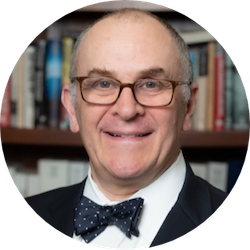World Order after Covid-19 Forum
Closing Remarks and Farewell
Wednesday, July 1
2:15 p.m. – 2:30 p.m. (EDT)
Eliot A. Cohen
Dean & Robert E. Osgood Professor of Strategic Studies, Johns Hopkins SAIS
Hal Brands
Henry Kissinger Distinguished Professor, Johns Hopkins SAIS; Scholar, American Enterprise Institute
Francis J. Gavin
Giovanni Agnelli Distinguished Professor and Director, Henry A. Kissinger Center for Global Affairs, Johns Hopkins SAIS

Dean & Robert E. Osgood Professor of Strategic Studies, Johns Hopkins SAIS
In July 2019, Eliot A. Cohen was appointed the ninth dean of the Johns Hopkins School of Advanced International Studies (SAIS). Cohen has been a respected member of the school’s faculty since his appointment as the Robert E. Osgood Professor of Strategic Studies in 1990.
Over the years Cohen has held several leadership roles at the school including directing the strategic studies program, founding and directing the Philip Merrill Center for Strategic Studies, and serving as the Executive Vice Dean this past year. He has twice won the school’s Excellence in Teaching Award and has extensive experience in executive education, including serving as an adjunct professor at the US Army War College.
Cohen is a 1977 graduate of Harvard College and earned his PhD in political science from the university in 1982. From 1982 to 1985 he was Assistant Professor of Government at Harvard, and Assistant Dean of Harvard College. In 1985 he became a member of the Strategy Department of the United States Naval War College. In February 1990 he joined the Policy Planning Staff of the Office of the Secretary of Defense, and in July of that year he was appointed Professor of Strategic Studies at Johns Hopkins SAIS.
From April 2007 through January 2009 he served as Counselor of the Department of State. A principal officer of the Department, he had special responsibility for advising the Secretary on Iraq, Afghanistan, Iran, Pakistan, and Russia, as well as general strategic issues. He represented the Department of State in interagency coordination with senior National Security Council staff, Department of Defense, and intelligence community officials on a number of issues, including the Syrian/North Korean reactor crisis of 2007.
Eliot Cohen is the author of The Big Stick: The Limits of Soft Power and the Necessity of Military Force (2017), Conquered into Liberty: Two Centuries of Battles along the Great Warpath that made the American Way of War (2011), Supreme Command: Soldiers, Statesmen, and Leadership in Wartime (2002). His other books are Commandos and Politicians (1978) and Citizens and Soldiers (1985). He is, as well, co-author of Military Misfortunes: The Anatomy of Failure in War (1990), Revolution in Warfare? Air Power in the Persian Gulf (1995), and Knives, Tanks, and Missiles: Israel’s Security Revolution (1998), and co-editor of Strategy in the Contemporary World (2002) and War over Kosovo (2001). From 1991 to 1993 he directed and edited the official study of air power in the 1991 war with Iraq. For his leadership of The Gulf War Air Power Survey, which included eleven book-length reports, he received the Air Force’s decoration for exceptional civilian service. His articles have appeared in numerous scholarly and popular journals, he publishes often in national newspapers such as the Washington Post, Wall Street Journal, and New York Times and is a contributing editor at The Atlantic.
In 1982 he was commissioned as a military intelligence officer in the United States Army Reserve. In the past he has served as a member of the Defense Policy Advisory Board and the National Security Advisory Panel of the National Intelligence Council, and of the Council of the International Institute for Strategic Studies, and of the Committee on Studies of the Council on Foreign Relations. He is an Adjunct Senior Fellow at the Center for a New American Security.

Henry Kissinger Distinguished Professor, Johns Hopkins SAIS; Scholar, American Enterprise Institute
Hal Brands is the Henry A. Kissinger Distinguished Professor of Global Affairs at the Johns Hopkins School of Advanced International Studies (SAIS) and a scholar at the American Enterprise Institute. He is also a columnist for Bloomberg Opinion.
He is the author or editor of several books, including American Grand Strategy in the Age of Trump (2018), Making the Unipolar Moment: U.S. Foreign Policy and the Rise of the Post-Cold War Order (2016), and What Good is Grand Strategy? Power and Purpose in American Statecraft from Harry S. Truman to George W. Bush (2014) His newest book is The Lessons of Tragedy: Statecraft and World Order, co-authored with Charles Edel.
Hal served as Special Assistant to the Secretary of Defense for Strategic Planning from 2015 to 2016. He has also consulted with a range of government offices and agencies in the intelligence and national security communities and served as lead writer for the Commission on the National Defense Strategy for the United States.

Giovanni Agnelli Distinguished Professor and Director, Henry A. Kissinger Center for Global Affairs, Johns Hopkins SAIS
Francis J. Gavin is the Giovanni Agnelli Distinguished Professor and the inaugural director of the Henry A. Kissinger Center for Global Affairs at Johns Hopkins SAIS. In 2013, Gavin was appointed the first Frank Stanton Chair in Nuclear Security Policy Studies and Professor of Political Science at MIT.
Before joining MIT, he was the Tom Slick Professor of International Affairs and the Director of the Robert S. Strauss Center for International Security and Law at the University of Texas. From 2005 until 2010, he directed The American Assembly’s multiyear, national initiative, The Next Generation Project: U.S. Global Policy and the Future of International Institutions. Gavin’s writings include Gold, Dollars, and Power: The Politics of International Monetary Relations, 1958-1971 (University of North Carolina Press, 2004) and Nuclear Statecraft: History and Strategy in America’s Atomic Age (Cornell University Press, 2012).
He received a PhD and MA in History from the University of Pennsylvania, a Master of Studies in Modern European History from Oxford University, and a BA in Political Science from the University of Chicago. Gavin is an Associate of the Managing the Atom Program at the Belfer Center for Science and International Affairs at Harvard University, Senior Fellow of the Clements Program in History, Strategy, and Statecraft, a Distinguished Scholar at the Robert S. Strauss Center, a Senior Advisor to the Nuclear Proliferation International History Project at the Woodrow Wilson Center, and a life-member of the Council on Foreign Relations.